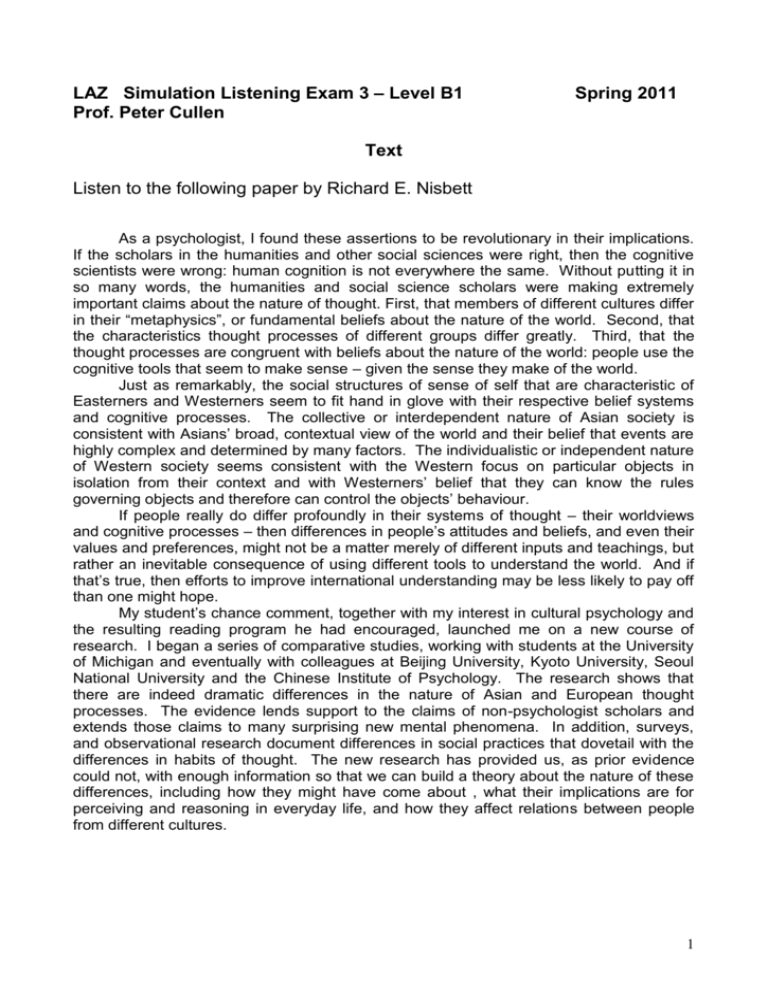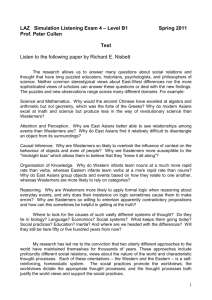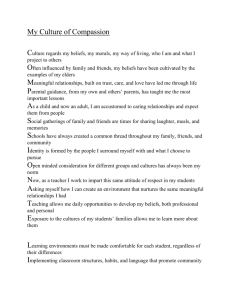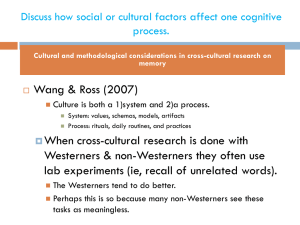B1 Simulation Listening Exam 3 05 2011
advertisement

LAZ Simulation Listening Exam 3 – Level B1 Prof. Peter Cullen Spring 2011 Text Listen to the following paper by Richard E. Nisbett As a psychologist, I found these assertions to be revolutionary in their implications. If the scholars in the humanities and other social sciences were right, then the cognitive scientists were wrong: human cognition is not everywhere the same. Without putting it in so many words, the humanities and social science scholars were making extremely important claims about the nature of thought. First, that members of different cultures differ in their “metaphysics”, or fundamental beliefs about the nature of the world. Second, that the characteristics thought processes of different groups differ greatly. Third, that the thought processes are congruent with beliefs about the nature of the world: people use the cognitive tools that seem to make sense – given the sense they make of the world. Just as remarkably, the social structures of sense of self that are characteristic of Easterners and Westerners seem to fit hand in glove with their respective belief systems and cognitive processes. The collective or interdependent nature of Asian society is consistent with Asians’ broad, contextual view of the world and their belief that events are highly complex and determined by many factors. The individualistic or independent nature of Western society seems consistent with the Western focus on particular objects in isolation from their context and with Westerners’ belief that they can know the rules governing objects and therefore can control the objects’ behaviour. If people really do differ profoundly in their systems of thought – their worldviews and cognitive processes – then differences in people’s attitudes and beliefs, and even their values and preferences, might not be a matter merely of different inputs and teachings, but rather an inevitable consequence of using different tools to understand the world. And if that’s true, then efforts to improve international understanding may be less likely to pay off than one might hope. My student’s chance comment, together with my interest in cultural psychology and the resulting reading program he had encouraged, launched me on a new course of research. I began a series of comparative studies, working with students at the University of Michigan and eventually with colleagues at Beijing University, Kyoto University, Seoul National University and the Chinese Institute of Psychology. The research shows that there are indeed dramatic differences in the nature of Asian and European thought processes. The evidence lends support to the claims of non-psychologist scholars and extends those claims to many surprising new mental phenomena. In addition, surveys, and observational research document differences in social practices that dovetail with the differences in habits of thought. The new research has provided us, as prior evidence could not, with enough information so that we can build a theory about the nature of these differences, including how they might have come about , what their implications are for perceiving and reasoning in everyday life, and how they affect relations between people from different cultures. 1 LAZ Simulation Listening Exam 3 – Level B1 Spring 2011 ______/30 Prof. Peter Cullen ___________________________________________ Name, Date, and Registration Number Questions: You do not have to use complete sentences! This is a listening exam. SIMPLE AND CORRECT IS BETTER THAN COMPLICATED AND WRONG. 1. What three claims did social science scholars make about culture? 2. What seems to fit with a culture’s belief systems and cognitive processes? 3. What is the inevitable consequence of using different tools to understand the world? 4. What did Nisbett’s comparative studies show? 1. What has Nisbett’s new research provided? ______/20 True or False: Write “True” or “False” in the space next to each statement 1. Is social scientists were right, then cognitive scientists were wrong. ________________ 2. Asians believe events are highly complex. ________________ 3. Westerners focus on context . ________________ 4. Differences in attitude depend on teaching. ________________ 5. Nisbett’s evidence supports psychologists. ________________ ______/10 2 LAZ Listening Exam 3 – Level B1 Prof. Peter Cullen Spring 2011 Answer Sheet 1. What three claims did social science scholars make about culture? First, that members of different cultures differ in their “metaphysics”, or fundamental beliefs about the nature of the world. Second, that the characteristics thought processes of different groups differ greatly. Third, that the thought processes are congruent with beliefs about the nature of the world: people use the cognitive tools that seem to make sense – given the sense they make of the world. 2. What seems to fit with a culture’s belief systems and cognitive processes? the social structures of sense of self that are characteristic of Easterners and Westerners seem to fit hand in glove with their respective belief systems and cognitive processes. 3. What is the inevitable consequence of using different tools to understand the world? then differences in people’s attitudes and beliefs, and even their values and preferences, 4. What did Nisbett’s comparative studies show? The research shows that there are indeed dramatic differences in the nature of Asian and European thought processes. 5. What has Nisbett’s new research provided? with enough information so that we can build a theory about the nature of these differences, including how they might have come about , what their implications are for perceiving and reasoning in everyday life, and how they affect relations between people from different cultures. True or False: Write “True” or “False” in the space next to each statement 1 2 3 4 5 T T F F F 3








